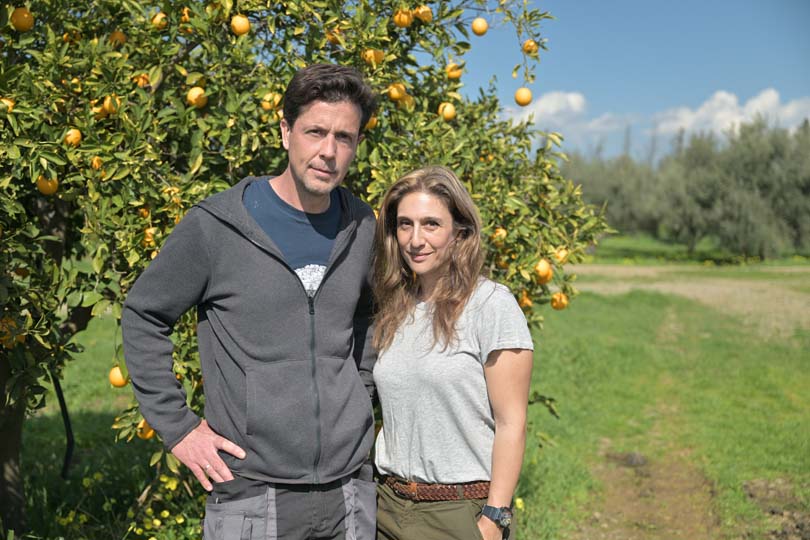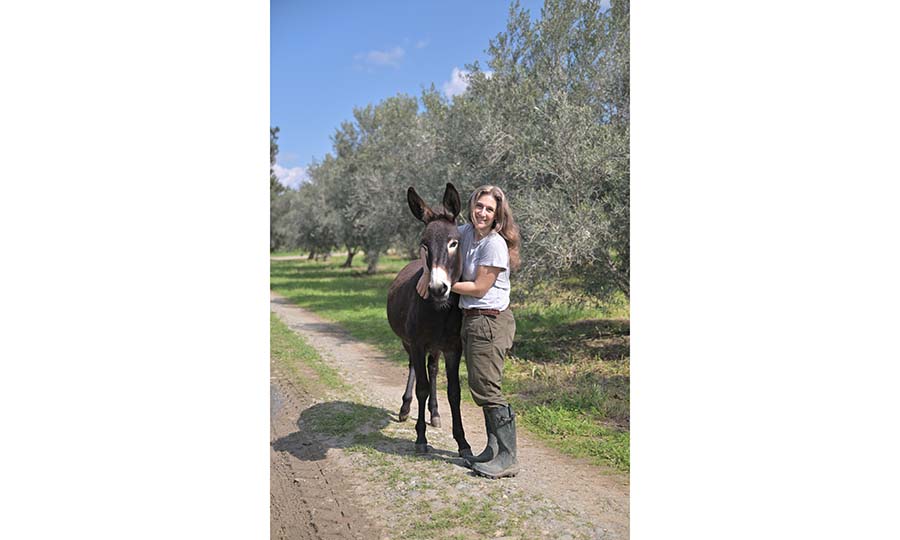Paris Demetriades
When Elena Christoforou was five years old, her godfather, who lived in England, had given her a BBC videotape, a series narrated by David Attenborough about life on planet Earth. "I had watched it so many times that the tape had worn out," she enthusiastically recounts to "K", standing amidst olive and orange trees on the farm she inherited from her grandfather in Akaki.
Before taking over Akaki Grove, as the farm is named today, Elena Christoforou pursued studies in various subjects abroad. From the captivating, as she describes it with passion, science of Geography to Anthropology and Psychology, she managed to complete two degrees and two postgraduate studies. In a somewhat magical way, "everything fell into place and brought me back to the farm," she notes. "Today, we are a farm that produces olives, olive oil, and citrus fruits. Emphasizing permaculture, we strive to do what is best for the environment. We want to have biodiversity because that helps. It helps with everything," she emphasizes.

Surplus or rejected food from a private school in Nicosia is utilized. "This way, we obtain free food for the hens, and the hens provide us with fertilizer and work for us. The hens become our workers. They are our personnel," says the biologist Nicola Netie.
First the soil
"The first thing we do is bring the soil back to life," comments French-born Nicola Nétié, who specializes in Environmental Engineering, soil biology, and waste management, working full-time on the farm. According to Nicolas, whom we meet at some open spot on the farm, his primary concern is to focus more on the soil than on the trees because "when you develop the soil, the trees follow." "The soil is the most complex ecosystem on the planet. If you have healthy soil, you need less water and less fertilizer, and you produce higher-quality products. At the same time, you help mitigate climate change," he emphasizes.
According to Nicolas, the central idea around permaculture and agroecology is to work with nature rather than against it. "We see a farm as an ecosystem that we try to keep as balanced as possible so that it doesn't require interventions from us. We don't have to, for example, buy fertilizers and use pesticides. We allow many indigenous and local species to grow and thrive because the more variety we have in plants and microorganisms, the more stability we gain."
Historically, agriculture has been one of the most harmful human activities, emphasizes Nétié. "But it can also prove to be one of the most beneficial. It depends on how you do it." So far, he adds, the norm has been to degrade the soil and cause desertification. "Due to human activity, this island, Cyprus, is now at risk of desertification because, for thousands of years, we have been destroying forests, cutting down trees, and intervening in the soil. However, we can use agriculture, or rather I would say we must use agriculture, to reverse the situation."
Hen ''workers''
"Because I want to design a productive ecosystem, there needs to be animals to accelerate the carbon cycle," explains Nicolas. "The soil greens need to become food for animals and turn into fertilizer. The fertilizer we use now is basically chicken manure that we import from Italy. So what do we need? Hens. At the same time, since Elena is a vegetarian and doesn't want to kill animals, we don't want to produce animal-derived products. When they turn two years old, hens stop laying eggs or lay very small eggs and are usually sent to the slaughterhouse, where they become dog food. So, we came up with the idea of bringing hens at the end of their... ''careers''. The idea was to bring such hens, let them retire on our farm, eat the greens on the ground, fertilize the trees, and control pests, like those falling from the olive trees, and the hens mix and eat them. This way, we also save on fertilizer expenses."
At the same time, because hens don't produce eggs, it's not cost-effective to buy them food, he adds. "But we have a huge food waste problem in Cyprus. The EU even fines us for this issue every year. We intend to take this food waste and give it to the hens. We get free food for the hens, and the hens provide us with fertilizer and work for us. The hens become our workers. They are our staff."
The Kot Kot
"The Kot Kot, as we have named it, is a program that brings hens from free-range farms, instead of being led to the slaughterhouse; they come here to serve us. They roam freely, eat whatever they find, are amidst the grass and flowers, have a good life, and do valuable work for us," adds Elena Christoforou. A crucial part of the project is that we educate and teach these things to small children, she adds. "We started a collaboration with a private school in Nicosia with about 800 children. We provided bins there for them to put their food, what they don't want, what they would throw away. Then we bring this excess food here, and suddenly it ceases to be considered waste because it is used for another purpose."
For the needs of the program, pioneering scientists and farmers went to the school they collaborated with to explain to the children what they are entitled to put in the bins of the Kot Kot and whatnot. "We told them that only two things are not allowed in the bins, onions and avocado, as they are toxic to the hens," notes Elena Christoforou. "All the rest goes in. The kids were thrilled!"
From problem to solution
Regarding the kot kot, we are in the initial and pilot stage, notes Nicolas. "Currently, we have 150 hens and we have planned to bring another 2,000 in April. The goal is to reach 15,000 hens. As for food waste, we can utilize around 500 tons in the medium term, which is certainly a drop in the total food waste of Cyprus, but it is a model that can be expanded. What we need now for kot kot to grow is a very simple and effective way of managing food waste. It is a circular economy mindset, and now we need support. We need support from private organizations and companies. We will need a van, bins, and little houses for the hens."
In conclusion, Nicolas believes that this is a method that is extremely simple and effective because it takes a problem and turns it into a solution, educates the public, and creates within the farm a circular economy system that can serve as a model, without external fertilizers and with minimal pesticides. "It is a win-win solution for everything. For the environment, the farm, the people, for everything. You really achieve all the goals of sustainable development."
Elena Christoforou's dream is to be able to expand the program to other farms in Cyprus and to make it as extensive as possible in collecting food waste. "It is an amazing example of a circular economy that could go from small to large scale," he concludes.
[This article was translated from its Greek original and edited for brevity and clarity]
































